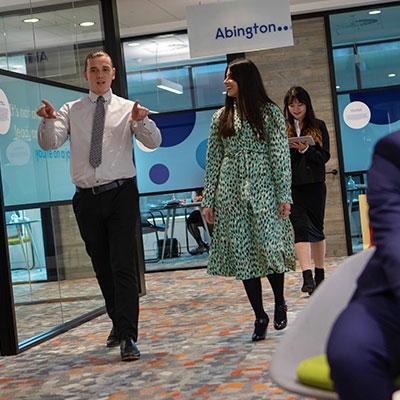With today marking the beginning of Autism Awareness Week, we at Reed Talent Solutions wanted to highlight the importance of inclusivity in your recruitment processes.
Why is inclusivity important?
Firstly, it is important to understand the definition of inclusivity and diversity.
We would define inclusivity as: ensuring your workplace does more to create an environment where everyone can be themselves and be comfortable in the workplace.
It is stating the obvious, but if your people can feel comfortable, they will bring their best to the workplace every day. Just as important is that if people feel comfortable then they will make their voices heard and you are far more likely to discover more about your workforce and their individual needs. Actively listening to your staff is proven to help with:
Increasing employee satisfaction
Producing higher employee productivity and collaboration
Enabling effective problem solving and creativity
Generating company growth and innovation.
Hiring a diverse range of people is not just about meeting your social or legal responsibilities, it is proven to deliver better results. Most companies will have a diverse range of customers – a diverse workforce will help them understand their target audience and customers’ needs better. This improves companies’ services or products, as well as customer engagement and brand image.
Strategies to create a more diverse workforce
Having a diverse workforce means including people from all walks of life in terms of ethnicity, gender, sexuality, disability, education, economic background and more. To execute a strategy which includes everyone, you must consider all of these areas:
Bias training – providing training for hiring managers against unconscious bias will ensure fairer decision-making, as many are unaware of their biases against people who are different to them.
Interview panel – having a diverse panel of interviewers means different points of view will be represented, making the process fairer. It will also show the interviewee you are serious about diversity and inclusivity.
Offering flexible and remote working options – since the pandemic necessitated this, it has been a welcome change for people with autism who might feel more comfortable at home where it is quiet, social interaction is limited to video calls, and they have everything they need.
Employer brand – an inclusive and welcoming brand image will attract more people to your business than one that seems to only represent a few types of people.
Target setting – applying diversity targets should not be used as a superficial way to improve your brand image, but to give everyone a chance to be represented within your company. Initially, it will help you identify areas where your organisation is lacking diversity.
Data capture – data on who enters and leaves your company, and why, will help you understand how best to improve your company culture and inform strategies to attract and retain more professionals.
Neurodiversity should not always be seen as a disability
Neurodiversity should not always be seen as a disability, it can be just a different way of thinking, but for many it can impact their daily life and their chances of securing employment.
‘Neurodiversity’ refers to differences in individual brain function and behavioural traits – part of normal human variation. In contrast, ‘neurotypical’ people are those without atypical conditions like autism and ADHD.
Autism can be an invisible disability which people may feel uncomfortable addressing. Often, people with autism will not tick a box on an application to say they are disabled. This is due to being able-bodied or high functioning, which means they do not see themselves as having a disability. As a result, they may not be getting the support they need from their employer.
People with autism have problems mainly around communication and social aspects of work. Everyone is different; some people will thrive in social situations, while others may find it challenging to recognise non-verbal communication and social cues.
However, neurodiverse workers are often better than neurotypical people at other professional soft skills including staying focused on tasks, being organised and structured, and thinking outside the box to solve problems.
A one-size-fits-all approach will not work for neurodivergent people
A one-size-fits-all approach will not work for neurodivergent people. Minor adjustments can be made to your recruitment process at every stage, widening your talent pool to people with disabilities:
Job descriptions – using inclusive language and carefully considering what is essential and desirable to the role. Commonly used phrases including “team player” or “excellent interpersonal skills” can exclude neurodivergent people who will feel that they do not fit this description and assume the role is not for them.
Application forms – providing full instructions on how to complete the form will help many neurodivergent people understand everything they need to include. Also, ensure you make space for them to add any extra support they need.
Interviews – this stage can be one of the most stressful for potential candidates. It is best to offer reasonable adjustments such as asking if they need more information on what to expect. Providing details on who they will be speaking to and where, as well as sending them the questions you will ask will help them build their confidence and show you their best selves.
Achieving true diversity and inclusion is a journey of continuous improvement
Reed Talent Solutions aims to help remove the barriers that stand between employers and talented professionals along the way. We also provide personal support for applicants to fully understand the process, answering any questions they may have and providing written details as required.
Autism Awareness Week is a great opportunity to start open and honest conversations about invisible disabilities and individual experiences, fostering a culture where people feel more comfortable being themselves at work.
To find out more about how Reed Talent Solutions can help you or your business when implementing a diversity and inclusion program or recruiting neurodiverse employees, contact us today.





